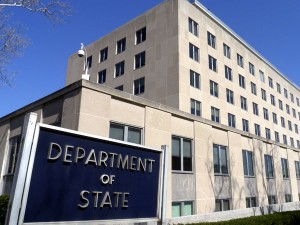Interpol, US worldwide security alerts spark embassy closures

File photo of the Harry S. Truman Building, headquarters for the State Department in Washington. The United States issued an extraordinary global travel warning to Americans Friday Aug. 2, 2013, about the threat of an al-Qaida attack and closed down 21 embassies and consulates across the Muslim world for the weekend. The alert was the first of its kind since an announcement preceding the tenth anniversary of the 9/11 terrorist attacks. AP
PARIS—Interpol issued a global security alert Saturday after jailbreaks linked to Al-Qaeda and as Western powers planned the temporary closure of certain embassies over terror threats.
Washington ordered its embassies across the Islamic world shuttered Sunday, while Germany, Britain and France were to close their missions in Yemen for at least two days.
Canada said its mission in the Bangladeshi capital Dhaka would also be shut Sunday.
Interpol, in issuing its alert, said it suspected Al-Qaeda was involved in recent jailbreaks across nine countries, including Iraq, Libya and Pakistan.
The global police agency said the jailbreaks had “led to the escape of hundreds of terrorists and other criminals” in the past month alone.
Article continues after this advertisementIt also asked its 190 member countries to help “determine whether any of these recent events are coordinated and linked” and to immediately convey any intelligence that could help prevent another incident.
Article continues after this advertisementInterpol alert preceded by US warning
The Interpol alert comes the day after Washington issued a worldwide travel warning, citing unspecified plans by Al-Qaeda to strike US interests in the Middle East or North Africa in August.
Interpol, based in the French city of Lyon, noted that August is the anniversary of attacks in India, Russia and Indonesia.
This week also marks the 15th anniversary of the US embassy bombings in the Kenyan capital Nairobi and Dar es Salaam in Tanzania, which killed more than 200 mostly African citizens and injured thousands.
General Martin Dempsey, chairman of the Joint Chiefs of Staff, told ABC News that the threats were directed at Western interests, and were “more specific” than previous threats.
While an exact target was unknown, “the intent seems clear. The intent is to attack Western, not just US, interests,” Dempsey said.
As a precaution, the State Department said it was closing at least 22 US embassies or consulates on Sunday, a work day in many Islamic countries.
Germany and Britain later announced that their embassies in Yemen would be closed Sunday and Monday, while France said its mission there would stay shut for “several days.”
Canada said its Dhaka mission was shutting as a security precaution and it would “continue to monitor events closely and take appropriate security measures.”
US President Barack Obama ordered his national security team to “take all appropriate steps to protect the American people,” a White House official said.
Worldwide alert for US citizens
He had been “updated on a potential threat occurring in or emanating from the Arabian Peninsula” and would continue to be informed through the weekend.
“Current information suggests that Al-Qaeda and affiliated organizations continue to plan terrorist attacks both in the region and beyond, and that they may focus efforts to conduct attacks in the period between now and the end of August,” the State Department said in the worldwide travel alert for US citizens.
The attacks were possible “particularly in the Middle East and north Africa, and possibly occurring in or emanating from the Arabian Peninsula.”
The alert warned of “the potential for terrorists to attack public transportation systems and other tourist infrastructure.”
Unnamed US officials told The New York Times that the warning was prompted after US officials intercepted electronic communications during the week among senior Al-Qaeda operatives who discussed strikes on US interests in the Muslim world.
“This was a lot more than the usual chatter,” one senior US official briefed on the information told the Times.
Hours after the US alert was issued, an audio recording was posted on militant Islamist forums in which Al-Qaeda chief Ayman al-Zawahiri accused the United States of “plotting” with Egypt’s military, secularists and Christians to overthrow Islamist president Mohamed Morsi.
In his first public comment on the July 3 military coup, the Egyptian-born Zawahiri said: “Crusaders and secularists and the Americanized army have converged … with Gulf money and American plotting to topple Mohamed Morsi’s government.”
Zawahiri, who belonged to the militant Egyptian Islamic Jihad group and is believed to be hiding in Afghanistan or Pakistan, criticized Morsi’s Muslim Brotherhood movement for going soft on applying strict Islamic law.
The United States has been especially cautious about security since an attack on its consulate in Benghazi, Libya, on September 11 last year.
The assault, blamed on Islamist militants, killed four Americans, including ambassador Chris Stevens.
Republicans have accused the Obama administration of failing to ensure adequate security at the Benghazi consulate.
Under Obama, US forces in 2011 killed Al-Qaeda’s fugitive leader Osama bin Laden in a secret raid on his hideout in Abbottabad, Pakistan.—Gina Doggett